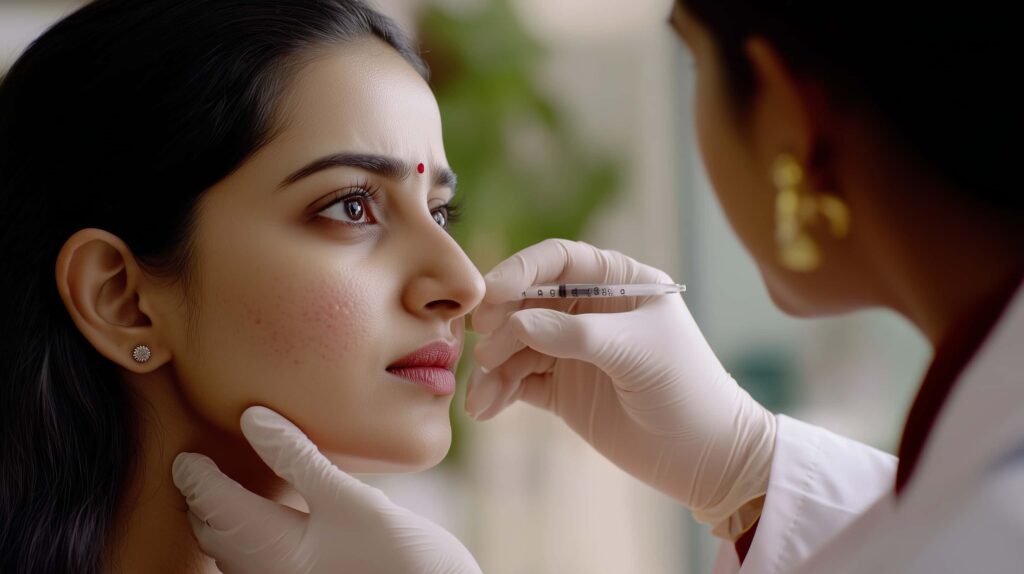10 Common Misconceptions About Acne Scars
Acne scars can be a persistent and frustrating aspect of dealing with acne, affecting both your skin and your confidence. However, numerous misconceptions about acne scars can prevent individuals from seeking effective treatments and achieving the clear skin they desire. Understanding the truth behind these myths is essential for anyone looking to manage and reduce the appearance of acne scars. In this article, we will debunk ten common misconceptions about acne scars, providing you with accurate information and empowering you to take proactive steps towards healthier, smoother skin. Whether you’re struggling with mild acne or severe breakouts, dispelling these myths can help you make informed decisions about your skincare routine and treatment options. Let’s dive into the realities of acne scarring and explore how you can effectively address and minimize their impact on your life.

Misconception 1: Acne Scars Are Permanent and Untreatable
One of the most prevalent misconceptions about acne scars is that they are permanent and cannot be treated. This belief can lead to feelings of hopelessness and discourage individuals from seeking solutions. In reality, acne scars are highly treatable with a variety of effective methods. Treatments such as laser therapy, chemical peels, microneedling, and dermal fillers have been proven to significantly reduce the visibility of acne scars. Laser therapy works by resurfacing the skin and promoting collagen production, which helps in smoothing out scarred areas. Chemical peels remove the top layers of skin, encouraging the growth of new, healthier skin. Microneedling involves using fine needles to create micro-injuries in the skin, stimulating the body’s natural healing processes and collagen production. Dermal fillers can be used to lift depressed scars, making them less noticeable. Additionally, advancements in skincare products and techniques continue to improve the effectiveness of these treatments. By consulting with a dermatologist, individuals can determine the most suitable treatment plan tailored to their specific scar types and skin conditions, debunking the myth that acne scars are forever.

Misconception 2: Only Severe Acne Causes Scarring
Many people believe that only severe or intense acne can lead to scarring, assuming that mild to moderate breakouts are harmless. However, this is not the case. Even mild to moderate acne can result in scarring, especially if the pimples are frequently picked or squeezed. When acne lesions are manipulated, it increases inflammation and damages the surrounding skin tissue, which can lead to the formation of scars. Repeated trauma to the skin from picking can disrupt the healing process, causing the skin to repair itself unevenly and form scars. Additionally, the type of acne plays a role; inflammatory acne, characterized by red, swollen pimples, is more likely to cause scarring compared to non-inflammatory acne. Factors such as genetics, skin type, and how one manages their acne can also influence the likelihood of scarring. Therefore, it is crucial to treat all acne with care, regardless of its severity, and adopt gentle skincare practices to minimize the risk of permanent skin damage. Understanding that even minor breakouts can lead to significant scarring underscores the importance of early and effective acne management.

Misconception 3: All Acne Scars Look the Same
Another common misconception is that all acne scars are identical in appearance. In reality, acne scars come in various forms, each with distinct characteristics and requiring different treatment approaches. The three main types of acne scars are atrophic, hypertrophic, and pigmented scars. Atrophic scars are the most common and are characterized by depressions or indentations in the skin. These include icepick scars, which are deep and narrow, and boxcar scars, which are broader with defined edges. Hypertrophic scars, on the other hand, are raised and form above the skin’s surface, often resulting from excessive collagen production during the healing process. Pigmented scars involve changes in skin color, typically resulting in dark spots or hyperpigmentation where the acne was present. Each scar type responds differently to various treatments. For instance, atrophic scars may benefit from microneedling or laser therapy, hypertrophic scars might require steroid injections or laser treatments, and pigmented scars can be treated with chemical peels or topical lightening agents. Recognizing the diversity of acne scars is essential for selecting the most effective treatment and achieving optimal results. A personalized approach, guided by a skincare professional, ensures that each scar type is addressed appropriately.

Misconception 4: Picking at Pimples Doesn’t Affect Scarring
Many individuals underestimate the impact of picking or popping pimples, believing it doesn’t significantly influence scarring. However, this behavior can severely exacerbate acne scarring. When you pick at a pimple, you introduce bacteria from your hands into the lesion, increasing the risk of infection and further inflammation. This additional inflammation can damage the surrounding skin tissue, making the scar more pronounced. Additionally, the mechanical trauma from squeezing can disrupt the skin’s natural healing process, leading to the formation of more severe scars. Dermatological studies have consistently shown a correlation between pimple-popping and increased scar formation. To minimize scarring, it is crucial to resist the urge to manipulate acne lesions. Instead, focus on proper acne treatment methods, such as using topical or oral medications prescribed by a dermatologist. If a pimple is particularly bothersome, seeking professional extraction ensures that it is removed safely without causing unnecessary damage to the skin. Adopting gentle skincare practices and avoiding manual manipulation of acne can significantly reduce the likelihood of developing noticeable scars, preserving the health and appearance of your skin.

Misconception 5: Acne Scars Only Affect Teenagers
A common misconception is that acne scars are solely a teenage issue, affecting only adolescents during their teenage years. In reality, acne and the resulting scarring can impact individuals of all ages. Adult acne is increasingly common, influenced by factors such as hormonal fluctuations, stress, diet, and lifestyle changes. Women, in particular, may experience acne related to hormonal cycles, pregnancy, or menopause. Men can also develop adult acne due to similar hormonal and environmental factors. The persistence of acne into adulthood can lead to chronic inflammation and prolonged skin damage, increasing the risk of scarring. Furthermore, adults may be more concerned about scarring due to established skin and higher expectations for appearance, making the impact of acne scars more pronounced. Effective treatments are available for adults, just as they are for teenagers, allowing individuals to manage and reduce the appearance of scars regardless of their age. Understanding that acne scarring is not confined to the teenage years encourages adults to seek appropriate skincare solutions and professional help to maintain healthy, clear skin throughout their lives.

Misconception 6: Over-the-Counter Products Are as Effective as Professional Treatments
Many people assume that over-the-counter (OTC) products are just as effective as professional treatments for acne scars. While OTC products can play a role in improving skin texture and tone, they generally offer more limited results compared to professional interventions. OTC treatments often contain active ingredients like retinoids, alpha hydroxy acids (AHAs), and vitamin C, which can help in exfoliating the skin, promoting cell turnover, and reducing hyperpigmentation. These products can be beneficial for mild to moderate scarring and for maintaining overall skin health. However, professional treatments such as laser therapy, chemical peels, microneedling, and dermal fillers provide more potent and targeted solutions for significant scarring. These procedures are performed by trained dermatologists or skincare professionals who can customize treatments based on the specific type and severity of scars. For example, laser therapy can precisely target scarred areas to stimulate collagen production, while microneedling creates controlled micro-injuries to enhance skin regeneration. Professional treatments often deliver faster and more noticeable results, making them a preferable option for those with deeper or more extensive scarring. Consulting with a skincare specialist can help determine the most effective combination of OTC products and professional treatments to achieve the best possible outcomes for your skin.

Misconception 7: Sun Exposure Doesn’t Impact Acne Scars
Another widespread misconception is that sun exposure has no effect on acne scars. In reality, ultraviolet (UV) radiation can significantly impact the appearance and healing of acne scars. Sun exposure can darken hyperpigmented scars, making them more noticeable and prolonging the healing process. UV rays stimulate the production of melanin, the pigment responsible for skin color, which can lead to the darkening of existing scars and the development of new hyperpigmented areas. Additionally, sun damage can degrade collagen and elastin fibers in the skin, worsening the texture and appearance of scars. This not only makes scars more visible but also impairs the skin’s natural ability to repair itself. To protect acne scars from the detrimental effects of the sun, it is essential to incorporate daily sun protection into your skincare routine. Using a broad-spectrum sunscreen with at least SPF 30, wearing protective clothing, and seeking shade during peak sun hours are effective measures to prevent further damage. By safeguarding your skin from UV exposure, you can enhance the effectiveness of scar treatments and maintain healthier, less noticeable scars over time. Understanding the role of sun protection is crucial in managing and minimizing the impact of acne scars.

Misconception 8: Diet Has No Role in Acne Scarring
Many believe that diet has no influence on acne scarring, thinking that what you eat doesn’t affect your skin’s ability to heal. While diet may not directly cause scarring, it plays a supportive role in overall skin health and can influence the healing process. A balanced diet rich in vitamins and minerals is essential for skin repair and regeneration. Nutrients such as Vitamin C are crucial for collagen synthesis, which helps in healing scars and maintaining skin elasticity. Vitamin E acts as an antioxidant, protecting the skin from oxidative stress and promoting healing. Zinc supports immune function and reduces inflammation, which can help prevent excessive scarring. Omega-3 fatty acids, found in fish and flaxseeds, have anti-inflammatory properties that can aid in reducing skin inflammation and promoting healthier skin. Additionally, maintaining adequate hydration through water intake ensures that skin cells remain healthy and can effectively repair themselves. While diet alone cannot prevent or eliminate acne scars, incorporating nutrient-dense foods into your meals can enhance your skin’s ability to heal and recover from acne-related damage. Therefore, adopting a healthy eating pattern is a valuable component of a comprehensive skincare regimen aimed at minimizing and managing acne scars.

Misconception 9: Acne Scars Are Purely Cosmetic Issues
A significant misconception is that acne scars are merely cosmetic and do not affect an individual’s overall well-being. In truth, acne scars can have profound psychological and emotional impacts. Visible skin imperfections can lead to lowered self-esteem, increased anxiety, and even depression. Individuals may feel self-conscious about their appearance, leading to social withdrawal and diminished quality of life. The stigma associated with acne scars can affect personal and professional relationships, causing stress and emotional distress. Mental health professionals recognize the link between skin conditions and psychological well-being, emphasizing the importance of addressing both physical and emotional aspects of acne scarring. Effective management of acne scars can therefore improve not only the appearance of the skin but also enhance overall mental health and self-confidence. Support systems, including counseling and support groups, can be beneficial for those struggling with the emotional effects of acne scars. By acknowledging that acne scars are not just a cosmetic issue but also a mental health concern, individuals are encouraged to seek comprehensive treatment approaches that address both their skin and emotional well-being.

Misconception 10: Acne Scars Will Heal on Their Own Over Time
Many assume that acne scars will naturally fade and disappear without any intervention, believing that time alone can resolve the issue. While it is true that some minor scars may improve gradually, many acne scars persist and do not fully heal without active treatment. The healing process for scars depends on various factors, including scar type, skin type, age, and environmental exposures. Atrophic scars, such as icepick or boxcar scars, are particularly resistant to natural fading and often require specific treatments to reduce their appearance. Even pigmented scars, which involve changes in skin color, may not fully resolve on their own and can remain noticeable for extended periods. Environmental factors like sun exposure can further hinder the natural healing process by darkening scars and impeding collagen production. Active interventions, such as laser therapy, microneedling, chemical peels, and topical treatments, can expedite the healing process and significantly improve the appearance of scars. These treatments work by stimulating collagen production, promoting skin regeneration, and addressing pigmentation issues. Relying solely on time to heal acne scars can lead to prolonged visibility and frustration. Therefore, seeking professional treatment and adopting a proactive skincare routine is essential for effectively managing and reducing the appearance of acne scars.
Wrapping Up
Understanding the true nature of acne scars and dispelling the common misconceptions surrounding them is the first step towards achieving healthier, clearer skin. Acne scars are not permanent or untreatable, and they can affect individuals of all ages, not just teenagers. Recognizing the different types of scars and the various treatment options available empowers you to take control of your skincare journey. Whether it’s opting for professional treatments like laser therapy and microneedling or incorporating effective over-the-counter products into your routine, there are numerous ways to address and reduce the appearance of acne scars. Additionally, adopting gentle skincare practices, protecting your skin from sun exposure, and maintaining a balanced diet can significantly enhance your skin’s healing process and overall health. Remember, acne scars are not just a cosmetic issue but can also impact your mental well-being, so seeking comprehensive care that addresses both physical and emotional aspects is crucial. Don’t let misconceptions hold you back from achieving the skin you deserve. Consult with a skincare professional today to explore the best treatment options tailored to your specific needs and take proactive steps towards improving your skin health and boosting your confidence. Your journey to smoother, scar-free skin starts now—embrace the solutions available and make informed decisions for a brighter, more confident you.







